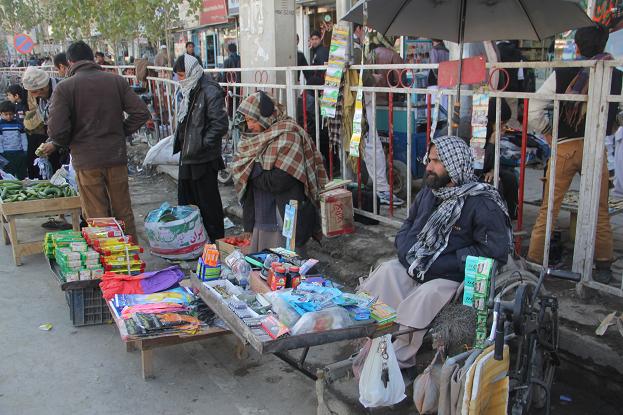RASC News Agency: The increasing prevalence of corruption by the Taliban group in Kabul, along with the weekly extortion of money from hand roller sellers and street vendors in the capital, amidst poverty and unemployment, has deeply troubled the people. In addition to corruption, the dishonoring, humiliation, and impoverishment caused by the Taliban members have led people to contemplate suicide.
Under the rule of the Taliban regime, Afghanistan experiences days filled with turmoil and agony. It is rare to find individuals who do not have painful stories of oppression, crimes, torture, and tyranny inflicted by this group.
Although the bitterness and pain have filled the hearts of millions of Afghanistani citizens, shaking the mental and emotional well-being of the people, the tribal despotism prevailing in Afghanistan is so horrifying, oppressive, and dictatorial that individuals cannot even confide their hidden pains with their closest friends out of fear of being spied on and apprehended by the group’s agents.
In the two years of their tyrannical rule over Afghanistan, the Taliban group has taken the non-Pashton community hostage through their discriminatory and revengeful behaviors. They exploit all available means to perpetrate injustice against non-Pashton ethnicities, predominantly Tajiks and Hazaras.
According to the findings of the RASC news agency, corruption within the Taliban’s government offices has reached its peak, with various departments competing to extort bribes from visitors.
The Ministry of Mines, the Attorney General’s Office, the Ministry of Interior, the Municipal Presidency, and the Passport Office are among the most corrupt government institutions under the Taliban group, each surpassing the other in extorting bribes from the people.
Based on the information provided by urban sources to the RASC News Agency, Taliban members in all areas of Kabul have imposed weekly payments, referred to as “designated bribes,” on street vendors and hand roller sellers. They have appointed a representative among the street vendors and drivers in each district to collect 400 to 500 kabuli rupees, which they have gathered from them on recent days, and deliver it to the authorities of the Taliban group. This allows them to engage in street vending with the assistance of hand roller sellers.
One of the hand roller sellers, named Ahmad Hamed, who sells merchandise in the Panjsad Family area of the 11th district of Kabul, told RASC that for several months now, he has been paying a weekly sum of 400 kabuli rupees to a representative appointed by the security branch of the Taliban group to collect money from street vendors in this area, in order to be allowed to continue his street vending business there. He said, “It has been nearly six months since I started working here. Initially, when I didn’t pay money, the Taliban members would come every day and confiscate all my merchandise from the cart. After a few days, the representative came and said I should either pay 400 Kabuli rupees or else I won’t be allowed to work here anymore, and they would take your cart as well.”
Hamed is a resident of Kapisa province and used to be an officer in the Afghanistan National Defense Ministry in the previous regime. Now, he engages in street vending only through hand roller, earning money to support his family of eight and provide for their daily sustenance.
He has said, “All of my capital amounts to four thousand kabuli rupees. I bring Okra and Eggplant from the market in the morning, and if I am able to sell all of it by the end of the day, I make a profit of two hundred kabuli rupees.”
He further states that despite working at this place from early morning until late at night, and not being able to see his children, he cannot even provide them with bread money and is forced to bribe members of the Taliban.
Meanwhile, another street vendor who sells apples and pears from morning till evening in the northern neighborhood of Kabul, in an interview with the RASC News Agency, has stated that alongside serious economic problems, debt, and his family’s illness, he faces daily insults, ridicule, and beatings from the Taliban, as well as ongoing bribery demands from members of this group in the area. These circumstances have made life bitter for him, and at times he contemplates suicide.
Living in a rented house in Kabul with his four family members, he says, “Serious economic problems, debt, illness, and rent on one side, daily abuse and insults from the Taliban on the other side, and weekly payment of bribes to them, push me to the point where I think it’s better to end my own life. But I think of my two-year-old daughter who waits for me from morning till night and doesn’t even sleep.”
This street vendor, who goes by the Elyas Jawad, is originally from Panjshir province. He reveals that in the previous regime, he held the rank of “Major” or “Captain” in the National Security Leadership and is now the sole breadwinner for his family. He had to leave his house in Panjshir out of fear of being arrested by the Taliban, but even here, he finds no peace.
He says, “When the Taliban see that we are Persian speakers, they insult us to such an extent that they even verbally abuse us shamelessly. Despite not saying anything to them, we are forced to bribe them on a weekly basis.”
This former soldier adds that if the Taliban find out that he is from Panjshir province, they will arrest him. According to him, even though he cannot talk about his encounters with this group, fearing Taliban spies, the current situation is so oppressive that he and several of his Tajik colleagues have contemplated suicide multiple times.
The Taliban, through discriminatory tribal behavior, mainly targeting non-Pashton ethnic groups, especially Tajiks, have made life difficult for them. Reports of arrests, torture, beatings, imprisonment, and killings of Tajiks are published in the media on a daily basis.






